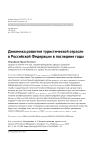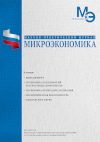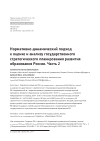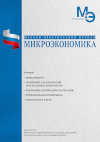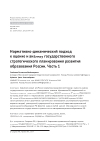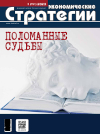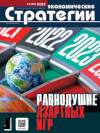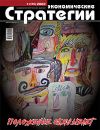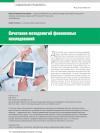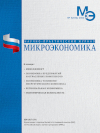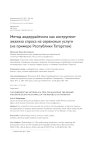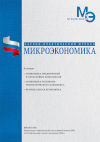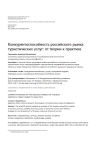Development dynamics of the tourist industry in the Russian Federation in recent years
DOI: 10.33917/mic-5.118.2024.41-51
The aim of the study was to identify current development trends in the tourism industry. When conducting the study, methods for processing qualitative and quantitative information were used: methods for analyzing the structure and dynamics of key indicators, graphical and tabular methods for presenting research results. The information basis of the study consisted of statistical materials of the Federal State Statistics Service of the Russian Federation, periodical scientific press, and Internet resources.
Based on the results of the analysis, the main problems in the tourism industry of the Russian Federation were identified: insufficient development of tourism and transport infrastructure, lack of the required number of qualified personnel to work in the tourism industry, insufficiently developed digital environment and information resources in the tourism industry, etc. Based on the identified problems, measures were recommended supporting the tourism industry: increasing investment in the tourism industry by raising funds on the basis of public-private and municipal-private partnerships, life cycle contracts and special investment contracts; increasing the number of budget and extra-budgetary places in tourism specialties, expanding the list of educational programs in tourism destinations, and other measures.
References:
1. Glebova O.V., Mitrofanova M.N. Assessing the economic security of a hotel enterprise. Economic security. 2023;6(3):1133-1152.
2. Federal State Statistics Service. URL: https://rosstat.gov.ru/statistics/
3. Ivantsov A.A. Problems and prospects for the development of domestic tourism in the Russian Federation. Sports, tourism and hospitality in the educational space: innovations and development prospects: collection of materials from the International Scientific and Practical Conference. Moscow, April 21, 2022. Moscow: Moscow State University of Sports and Tourism, 2022. pp. 27–32.
4. Levina A.B., Trofimenko E.Yu., Yakunina Yu.S. Problems and prospects for the development of domestic tourism in Russia. Man. Sport. Medicine. 2023;23(S1):175–187.
5. Samakaeva M.D., Kovaleva I.N. Problems of development of domestic tourism in the Russian Federation. Industrial Economics. 2021;5–1:46–49.
6. Strategy for the development of tourism in the Russian Federation for the period until 2035. URL: http://static.government.ru/media/files/ FjJ74rYOaVA4yzPAshEulYxmWSpB4lrM. pdf
7. Ministry of Economic Development of the Russian Federation. URL: https://www.economy.gov.ru/
8. Tourism.RF Corporation. URL: https://tourism.rf/
9. Lavrov V.V. Trends in the development of tourism in the Russian Federation in the context of the new economic reality. Petersburg Economic Journal. 2022;1–2:178–185.
10. Nikolenko P.G., Terekhov A.M. Analysis of the state of the tourism industry in Russia and the direction of its development. Statistics and Economics. 2022;19(4):57–70.
11. Rusina A.N., Karpycheva O.V., Yakimova E.A., Likhman D.A. Prospects for the development of domestic tourism in modern conditions. Economics, entrepreneurship and law. 2021;11(10):2343–2356.



